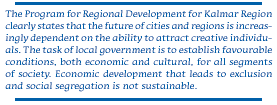 |
|
Towards the title of Capital of Culture
|
by Ms Madeleine Evers
The specific impact of cultural policy is
dependent on implementation by creative individuals, groups
and networks.
Kalmar, is striving towards sustainable development,
both cultural, economic, and environmental. This goal connects
divergent interests and fills the so called "grey zone"
between culture and the business community with a common
purpose. More creativity exists in the business sector than
is identified. Economic interests, though often unacknowledged,
are the driving force in cultural projects. Building cultural
bridges and creating meetings across borders is the city's
goal in the "European Capital of Culture" project,
a title towards which Kalmar Region aspires. The strong
connection to our Baltic neighbours is highly valued and
we look forward to cooperation with Riga in this process.
The significance of our joint participation will reach far
beyond 2014. It will make a lasting contribution to European
cultural interaction, sustainable development and the quality
of life. In Kalmar, as in whole Sweden, cultural issues
have long held a position of prominence on the political
agenda. The traditionally close ties with UN Conventions
concerning human rights, the fight against poverty, promotion
of cultural diversity and youth and gender equality issues
ensure a particularly egalitarian focus in cultural policy
making. The economic effects of these policies must be seen
in terms of long term contribution rather than specific
impact alone. 'Culture' is a concept, with wide ranging
implications, which not only refers to the above but encompasses
all of the Arts.

Cultural production in the form of 'cultural
goods' is indisputably a part of the marketplace and a substantial
contributor to economic growth, as is the cultural service
sector. In Kalmar Region cultural goods and services are
predominantly linked to existing preconditions, such as
cultural heritage and agrarian lifestyle providing urban
population with recreational opportunities and attracting
investment in cultural tourism. It is evident that 'quality
of life' in Kalmar not only has significance for tourism
and social sustainability, but also attracts corporate investment.
Much publicized recent venture by the Chinese corporation
Fanerdun Group in a "Wholesale Commodities Trade Centre"
in Kalmar testifies to this fact. It is a sizable economic
boost for Kalmar, but it also enriches our architectural
and cultural landscape. In cooperation with the region of
Changxing in China a "China Culture Week" is planned
in 2008.
|
Further information:
Ms Madeleine Evers
Department for Development and International
Affairs
E- mail: madeleine.evers@kalmar.se
|
|
|